Sergeant Paul Schuler, U.S. Army – Lifelong Leadership Lessons from Vietnam
Sergeant Paul Schuler, U.S. Army, has an amazing memory. During our three-hour interview, he went from story to story, recalling with great detail his Army experience and his tour of duty in Vietnam. I could tell very quickly the year Paul spent in Vietnam from April 1970 to April 1971 is indelibly inscribed in his identity. His leadership, his work ethic, his relationships, and his sense of duty and honor all relate back to the year a twenty-year-old kid spent serving his country in Vietnam. This is his story.
Paul has deep midwestern roots. He was born and raised in Omaha, Nebraska, where he attended Cathedral High School. After graduating in 1967, he attended the University of Nebraska Omaha, which entitled him to a temporary deferment from the ongoing Vietnam War draft. He also set his sights on becoming an electrician and he joined the local electrician’s union in April 1969. All was going well until the spring of 1969 when Paul decided to change his college major and let the number of hours he was enrolled in fall below the required minimum. The result was a draft notice with a report date of August 11, 1969.
Paul’s report date had special significance because his father was drafted for service in World War II and had a report date of August 11, 1941. Paul’s father landed on the beaches of Normandy on June 9, 1944, and marched with the 30th Infantry Division all the way to Germany. Paul’s father was an Army cook whose favorite story was how he traded vanilla and sugar with the French in return for some ice cream around the Thanksgiving holiday. The men in his unit were so thrilled to get the ice cream, from that point on, Paul’s father could do no wrong. Paul’s father gave him lots of advice about what to do and not do in the Army, all of which Paul tried to follow.
When Paul reported to the Draft Board on August 11, there were about fifty draftees being inducted. As the men lined up, they were asked if anyone wanted to volunteer to serve in the Navy. Hoping to avoid ground combat, over a dozen guys quickly crowded to the front of the room and the required quota was accepted and marched off. Paul thought that odd because the Navy wasn’t part of the draft. In fact, he’d tried to enlist in the Navy Seabees and was told the Navy didn’t need people right now. Then he realized the Marine Corps was part of the Department of the Navy and figured those draftees had unwittingly volunteered to go to the Marines, which was indeed part of the draft. Paul was very happy he had not volunteered.
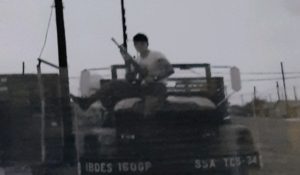
After being sworn in, Paul and the others were flown to Fort Lewis, Washington, for Basic Training. He remembers pulling up to the camp in a bus and hearing a deep, booming voice outside yelling at the trainees to get off the bus. As he stepped off the bus, he looked for the giant barking the orders but was surprised to see a short drill sergeant who could not have weighed more than 130 pounds. Paul must have stared because the drill sergeant asked him “What the hell are you looking at?” Paul hoped he had not already gotten himself on the wrong side of his new boss.
One of the first drills Paul remembers doing was the “low crawl” where he had to crawl on his belly like an alligator through a pit. The first time he did it, the trainee in front of him stopped and Paul thought the drill sergeant would soon be there yelling at the guy to get moving. Instead, the drill sergeant began screaming at Paul, demanding to know why he wasn’t moving. Paul answered that the man in front of him had stopped, to which the drill sergeant replied, “then go over the top of him.” Paul complied, as did a number of other trainees behind him. Paul said the trainee who initially froze in the pit never stopped again.
Paul did well at boot camp. About two weeks into training, he was selected to be his Platoon Guide, to whom four trainee squad leaders reported. This surprised Paul because he’d never been picked to be first for anything before. They asked Paul if he was afraid to take the position. He was but he said he wasn’t, demonstrating for the first time a skill he learned in the Army to tackle problems even if a solution wasn’t immediately apparent. He faced a number of leadership challenges from the men he worked with during his time at boot camp, but was able to overcome them all. He was even asked to go to Officer Candidate School but declined because his father told him in combat in France, junior officers suffered high casualty rates. He’d also heard about junior officers being threatened or killed by their own men in Vietnam, so it was not something he wanted to do. He also turned down an opportunity to go Airborne, but ended up enlisting for three years instead of his two-year draft obligation in return for attending cable splicing school. Paul thought the school might help his career as an electrician once he returned to civilian life.
Shortly before graduation from Basic Training, Paul bruised his heel on the agility course. Because he’d done well, his drill sergeant took it easy on him, even allowing him to avoid an eleven-mile forced march. The drill sergeant told him, though, if he was injured, he would not be allowed to graduate. So, when Paul went to sick call for a progress check on his foot, the doctor asked him how his foot was and he said it was fine. He then walked out of sick call as if nothing was wrong, even though his heel still hurt. He was cleared to graduate on time. Again, his drill sergeant looked out for him and told Paul he did not have to march in graduation. Instead, he could meet up with his unit afterwards at the barracks, which he did.
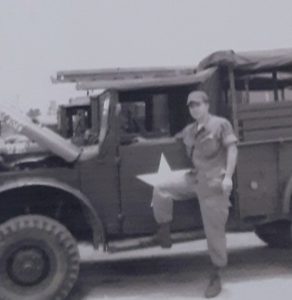
After boot camp, now Private (E-2) Paul Schuler flew to Sheppard Air Force Base near Wichita Falls, Texas, for cable splicing school. Again he excelled, despite having a math instructor who seemed to have it out for him because he looked like someone the math instructor got into a fight with in Germany. On the final Friday at the school, Paul was told to report to the orderly room at 4:30 p.m. To his surprise, he was promoted to Private First Class (E-3), but was directed to get his new rank sewn on his uniform before the bus departed at 5:00. He caught the seamstress at the uniform shop just as she was leaving and convinced her to help him. He made it to the bus on time, now wearing the rank of a Private First Class.
The bus took Paul to Fort Sill, Oklahoma, where he was assigned to the temporary barracks. He stood duty on Saturday night and slept all Sunday. On Monday morning, he was called to see the captain. He tried to think of what he might have done wrong, but couldn’t come up with anything. The captain told him he had graduated first in his class at the Air Force cable splicing school and that any time the Army could take top honors at an Air Force school it was a big deal. The captain meritoriously promoted Paul to Specialist (E-4) on the spot. Having been a Private (E-2) just three days before, Paul considered this a good weekend.
Paul spent little time at Fort Sill. He took two weeks leave to visit his family in Omaha, en route to Vietnam. Paul’s father took him to the airport, where he simply said, “I’ll see you next year.” Paul flew to Oakland, California, and reported to the holding barracks to await his flight to Vietnam. While there, he was able to visit with his aunt and uncle. His uncle took him to the airport and started to cry about Paul going to war. Although Paul appreciated that his uncle was worried about him, he was glad his father had not been emotional because his father and his father’s World War II experience gave him confidence.
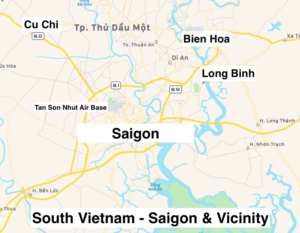
Paul flew to Vietnam on a chartered commercial airplane, with stops in Hawaii, Wake Island, Midway Island, and the Philippines along the way. As the plane arrived over Bien Hoa Air Base near Saigon in South Vietnam, Paul remembers looking out the window and seeing bomb craters around the runways. Suddenly the Vietnam War seemed real. The person sitting next to Paul told him not to worry because those were not all recent craters and that they had accumulated over time. Still, when the plane landed, everyone ran from the plane to the assembly building to minimize their exposure to enemy fire. As they did, they were passed by military personnel running in the opposite direction to board the plane on their way out of Vietnam. Paul vowed when he left Vietnam, he would not run to the airplane.
Because Paul arrived in Vietnam as an individual replacement soldier and not as part of a unit, he was loaded on a bus headed for Long Binh, the Army’s largest base in Vietnam. The bus had a heavy metal mesh covering the windows, which he assumed would prevent a grenade from being thrown inside. The bus driver told the new arrivals if anything happened, hit the floor and don’t look out the windows. The war was becoming more real by the minute.
Once at Long Binh, Paul was taken to the 90th Replacement Battalion to await his assignment. At one of the daily formations, the soldiers were asked if they had any relations in country. Paul and five others raised their hands and they were escorted to the Red Cross tent. There Paul learned that his older brother, Pete, was close by in Saigon at a unit near Plantation Road, which was known for being a particularly rough area. Paul was able to visit Pete almost immediately and Pete helped Paul learn how to navigate the hazards of the bars and cyclos (three-wheeled bicycle taxis) in the Plantation Road area. In fact, on their first visit to the street, Paul saw a soldier bloodied in a bar fight, had someone try to sell him heroin, and had a kid try to rob him. He quickly learned his new uniform was a signal to everyone on the street that he was a recent arrival in Vietnam and a potential easy target.
After a few days, Paul was assigned to the 69th Signal Battalion, 1st Signal Brigade, located at Camp Gaylor on Tan Son Nhut Air Base near Saigon. The battalion was responsible for maintaining the communications between headquarters units in Saigon and the rest of the forces operating throughout Vietnam. Although Paul was trained as a cable splicer, there were no openings for that job specialty at the time, so he was assigned to repair telephones. This required him to travel to other units at Long Binh and in Saigon to address their telephone issues. He also got his license to drive jeeps, three-quarter ton trucks, and the big two and a half ton trucks (deuce and a half trucks). It was the deuce and a half license that got him is first big assignment when, as the only one in his shop authorized to drive the big trucks, he “volunteered” to drive a truck to Long Binh to install 500 telephones. Here he violated his father’s advice by driving the lead truck in the convoy, but as the junior driver he had no choice. The convoy went without incident and Paul’s team installed the phones.
Over the course of the next year, Paul installed and repaired phones all around the Saigon area, sometimes even for generals and admirals. On one occasion, he was atop a telephone pole working with wires when a couple of bullets whizzed by. He figured the shooter must be some distance away and had no way of correcting his aim, so Paul simply put the telephone pole between him and where he thought the shooter was and finished his job. This was the only time he believes he was directly shot at, but there was no question about the danger of working alone in Saigon, especially when driving to and from worksites. Local criminals would try to stop Paul’s truck to loot it, so he always carried a side arm when driving on duty around Saigon.
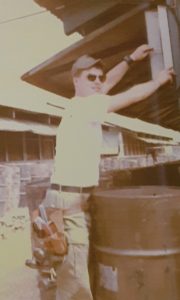
Paul had a host of other duties in Saigon. For example, in addition to standing guard duty in a tower overlooking the base, he worked with a staff sergeant to drive prisoners being processed out of Vietnam via Bien Hoa Air Base. He also made deliveries and pick-ups for the NCO club from 7:00 a.m. to 11:00 a.m. every morning, earning an extra $1.25/hour before starting his afternoon telephone repair shift. Although he usually worked alone or with one or two others, he liked the freedom. As long as he got his work done, he could essentially be his own boss. For this reason, he turned down an assignment at the Military Assistance Command – Vietnam (MAC V) Headquarters as he would have been cooped up in an operations center with lots of senior people micromanaging his every move.
Paul particularly enjoyed problem solving. On one occasion, his staff sergeant told him there was a communications emergency at a Vietnamese Army compound. Paul drove a jeep there and found a teletype-like machine that would no longer print. When Paul listened on the machine’s phone line, he heard what sounded like voices on a party line. Over his Vietnamese host’s objections, he walked around the building until he found a phone off the hook and hung it up. When he went back to the teletype, it was again printing properly. Apparently, someone had illegally tapped into the teletype line to install a voice phone and the open line prevented the teletype from printing. Even though Paul’s Vietnamese allies could speak no English, their reaction let him know he was now their hero.
Two events occurred during Paul’s tour in Vietnam that every veteran can relate to. First, he was assigned to the Alert Force to defend the base in the event of an attack. More specifically, he was assigned as the M79 grenade launcher operator. The problem was, he had never seen one, so he asked his staff sergeant if he could take a look at it. The staff sergeant said no and when Paul asked why, the staff sergeant said it was because the unit didn’t have an M79 grenade launcher—so much for Paul’s job on the Alert Force. The second event came in February of 1971 when Paul learned his unit was starting to withdraw and that everyone with at least ten months in country would be sent home. Since Paul would have over ten months by February, he looked forward to going home. Then he received the bad news from his First Sergeant—he would not be going home because as a cable splicer, he was too important. So, even though Paul had never spliced a single cable in Vietnam, he was prevented from going home because he had attended cable splicer school after Basic Training.
By this time a Sergeant (E-5), Paul kept busy during his final forty-five days in country supervising the phone repair crews who were not yet eligible to go home. With only twenty-three days remaining, he drove a friend to visit a buddy in Cu Chi. Because it was an off-duty trip and close by, they didn’t take any weapons with them. Once there, they learned that two of the villages they’d driven through were under Viet Cong control. On the way back, they sped through the villages and made sure they were out of the area before dark. Years later, Paul learned that the road they traveled had also been mined.
Paul completed his tour in Vietnam in April of 1971 and departed on a flight out of Bien Hoa Air Base. Remembering his promise to himself when he arrived, he began walking to the waiting airplane. About halfway, he changed his mind and ran the rest of the way. He didn’t want anything to stop him from returning home.
Although Paul was happy to be going home, the thought of returning to a normal life mortified him. He’d learned to survive in Vietnam, with his adrenaline always pumping, so he didn’t know how he’d react back in the states. When he arrived in California, his aunt and uncle took him to dinner. Besides hearing someone call him Paul for the first time in a year, he found himself stopping at the restaurant entrance and checking out the dining area to make sure it was safe. On another occasion as a guy walked in his direction, he clutched his pocketknife and prepared to defend himself. He found it hard to date women because at twenty-one and a Vietnam veteran, he was too mature and different for women his age. He even had to deal with former acquaintances who actually asked him how many babies he’d killed. In short, he was no longer the innocent Catholic boy who’d flown off to Vietnam just twelve months before—he was a soldier. Only after working through these issues with some fellow-Vietnam veterans on his follow-on Army assignment in Germany was he able to feel comfortable integrating back into the civilian world.
Paul was honorably discharged in March of 1972 on an early-out program. He returned to Omaha and his career as an electrician, which he continued until he retired in 2011. He also met and married his wife, LaDona, in Omaha after he returned, and together they raised five boys and two girls, all of whom are successful in their own right. Paul continues to be active in both the American Legion and the Veterans of Foreign Wars, having previously served as a post commander. He also served on the Omaha Selective Service Board for twenty years.
As Paul looks back, he credits the Army with teaching him to tackle the impossible job, a trait that made him successful as an electrician and something he made sure to pass on to his children. “Follow me” he says, and together we’ll come up with a solution.
Voices to Veterans is proud to salute Sergeant Paul Schuler, U.S. Army, for his unwavering service to our country during the Vietnam War. We are proud to follow you, Paul, and are thankful for your can-do spirit and resourcefulness when our country needed you most.
If you enjoyed Paul’s story, please sign up for the Voices to Veterans Spotlight monthly newsletter by clicking here. Once each month, you’ll receive a new written veteran’s story and a new podcast directly in your mailbox. Best of all, it’s free and you can unsubscribe at any time.


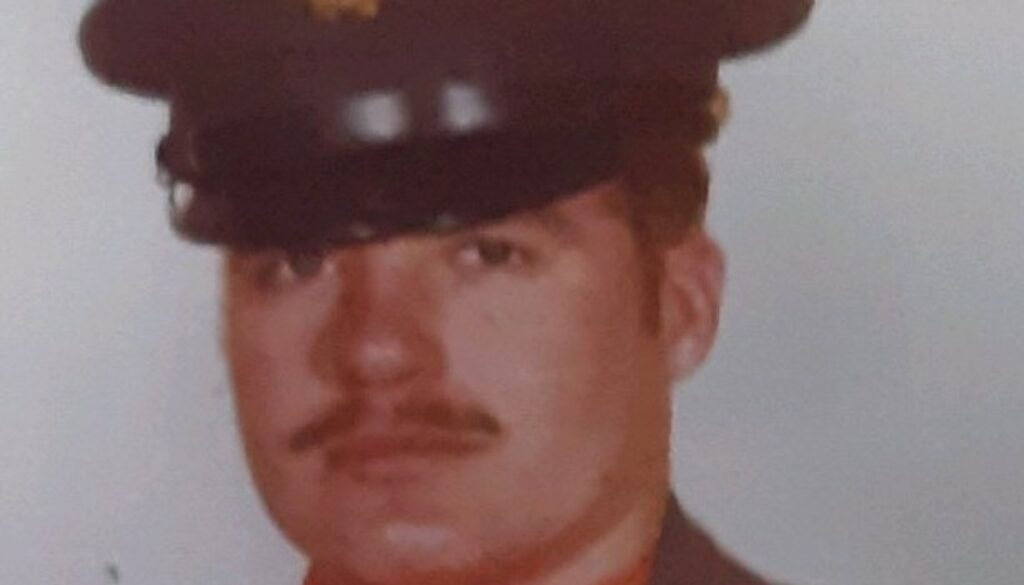
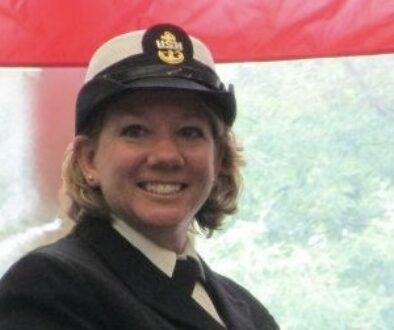
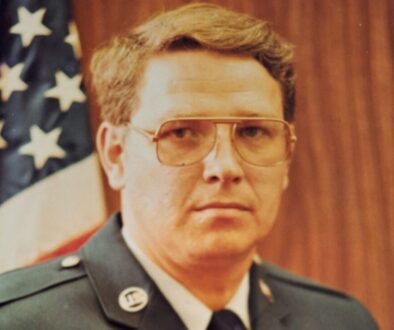
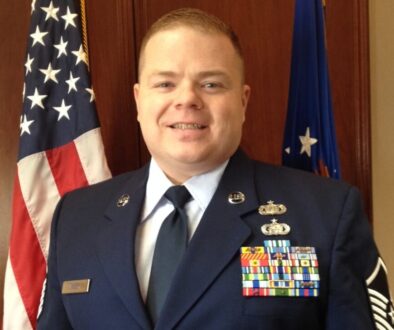
May 1, 2020 @ 4:54 PM
Paul was my platoon Sgt. in Germany. We became friends and I would go with him around Germany while he purchased ‘grandfather clocks’ to ship back to Omaha where his parents had a store.
I had respect for Paul because he was a good person and always had a gentle spirit. He reminded me of my older brother in that way.
May 2, 2020 @ 9:02 AM
Ralph – thanks for your comment. I’ll make sure Paul sees it. I really appreciate your service in the Army, as well. Being assigned in Germany at the height of the Cold War had to be pretty interesting, to say the least!
August 19, 2024 @ 10:07 PM
I was arCamp Gaylor 1969 and 1970.I have been back to Vietnam many times
August 20, 2024 @ 11:10 AM
Archie,
Thanks for reading Paul’s story and for your service in Vietnam.
V/r,
Dave Grogan